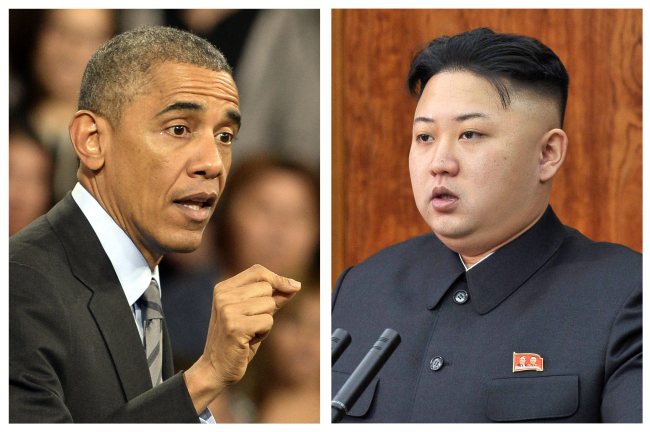Tension between U.S. and N. Korea escalates
2015-01-04 22:03
Tension between the United States and North Korea further escalated over the weekend as Washington imposed new economic sanctions Friday against Pyongyang in retaliation for the reclusive regime’s alleged cyberattack on Sony Pictures Entertainment.The North’s Foreign Ministry responded angrily to the punitive measures Sunday, saying that America’s “tenacious adherence” to a hostile policy toward the North would further reinforce its will to protect its sovereignty.
U.S. President Barack Obama signed an executive order Friday, while on vacation in Hawaii, to approve sanctions against three North Korean organizations and 10 senior officials as part of his “proportional response” to the attack on Sony that produced the “Interview,” a comedy about a scheme to assassinate North Korean leader Kim Jong-un.
Announcing the decision, the White House accused the North of carrying out “provocative, destabilizing and repressive actions and policies, particularly its destructive and coercive cyberattack on Sony Pictures.” It also said, “Today’s actions are the first aspect of our response.”
 |
| A composite showing US President Barack Obama in Las Vegas, Nevada, USA, 21 November 2014, delivering remarks on his immigration policy and a photograph released by the North Korean Central News Agency (KCNA) on 01 January 2013 showing North Korean leader Kim Jong-un delivering a New Year`s Day address in Pyongyang, North Korea. (Yonhap) |
Seoul’s Foreign Ministry called the sanctions an “appropriate response,” reiterating that cyberattacks to damage private and corporate interests and the openness and security of cyberspace should not be tolerated.
Those sanctioned will be banned from accessing the U.S. financial system and doing any transactions with U.S. nationals. But the largely symbolic sanctions are unlikely to further damage the economy of the heavily isolated country which is already under a series of international sanctions for its nuclear and missile tests.
The sanctions target the North’s Reconnaissance General Bureau, the country’s premier military spy agency, which Washington and Seoul believe orchestrated a series of cyberincursions against them. Seoul also blames the RGB for launching a string of fatal provocations including the 2010 torpedo attack on the corvette Cheonan that killed 46 sailors.
Korea Mining Development Trading Corp., in charge of the arms exports, and Korea Tangun Trading Corp., a defense research agency, have also been added to the sanctions list, as well as 10 senior officials, including those operating in Iran, Syria, China, Russia and Namibia.
“Even as the FBI continues its investigation into the cyberattack against Sony Pictures Entertainment, these steps underscore that we will employ a broad set of tools to defend U.S. businesses and citizens, and to respond to attempts to undermine our values or threaten the national security of the United States,” U.S. Treasury secretary Jack Lew said in a statement.
The sanctions came as Pyongyang has hardened its rhetoric against the U.S., while continuing its peace offensive toward the South and refraining from launching its usual verbal attacks against Seoul.
“The U.S. is wholly responsible for its hitherto antagonistic, hostile relationship with North Korea. The U.S. should throw away its hostile policy toward the North,” said a piece in Saturday’s edition of the Rodong Sinmun, the daily of the North’s ruling Workers’ Party.
“Should the U.S. come forward with good will while respecting our sovereignty without intervening in our internal affairs, we would respond to that accordingly.”
The two Koreas have moved closer to dialogue since the North Korean leader demonstrated his desire to hold a “top-level meeting” with the South and restore cross-border ties in his New Year address.
Supporting the U.S. sanctions against the North, Seoul appears to have reaffirmed that it would deal separately with the issues of inter-Korean cooperation and provocations such as the nuclear development and cybervandalism.
In response to Kim’s New Year’s address, Seoul reiterated that it remained open to dialogue in any form. Some observers said the North could specify its desire for inter-Korean talks this week, while others presume that it may wait until after President Park Geun-hye delivers her New Year’s speech, which is expected to be delivered on Jan. 12.
The upcoming impediment to inter-Korean dialogue would be the planned annual military exercise between the U.S. and South Korea, which will begin in February. The North Korean leader has called on the allies to cancel the exercise, but the South said the “defense” drills will proceed as planned.
By Song Sang-ho (sshluck@heraldcorp.com)


